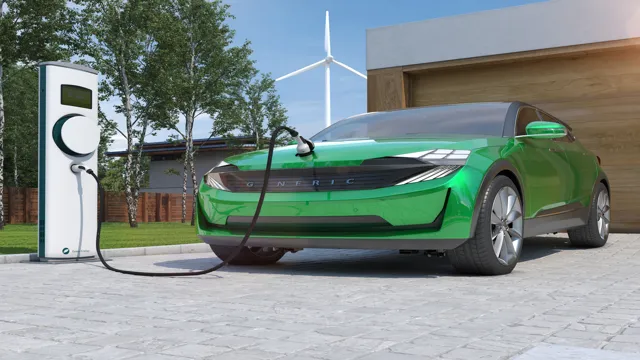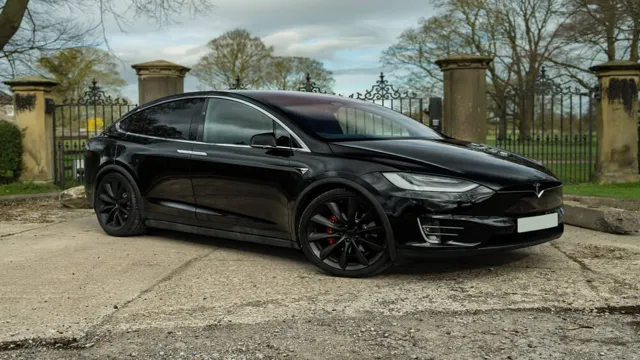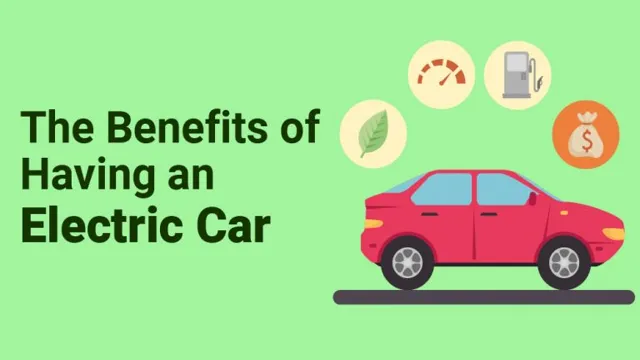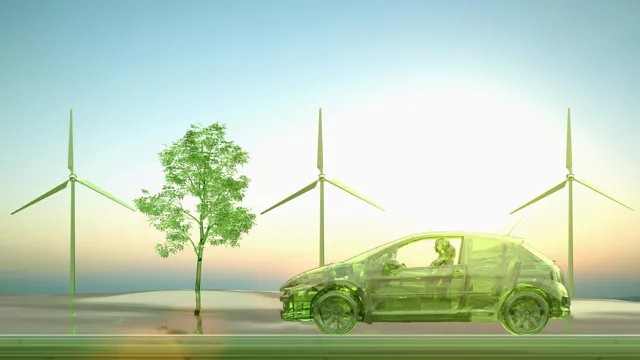Powering the Economy: Exploring the Economic Benefits of Electric Cars
Electric cars are the hot button topic of the moment, and for good reason. With growing concern over climate change and air pollution, many are turning to electric cars as a way to reduce their carbon footprint and contribute to a cleaner environment. But electric cars aren’t just about eco-friendliness – they’re also having a significant impact on the economy.
In this blog post, we’ll explore the ways in which electric cars are affecting the economy, from the way they’re changing the auto industry to the impact they’re having on government revenues and consumer spending. Get ready to dive into the world of electric cars and the economy!
Reduction in fuel costs
One of the key benefits of electric cars is their ability to reduce fuel costs, which can have a significant impact on the economy. With the rise of electric cars, there has been a shift away from traditional gasoline-powered vehicles, which require regular fill-ups with expensive fuel. Instead, electric cars can be charged at home or at electric charging stations, which are often cheaper than gasoline prices.
This reduction in fuel costs not only benefits individual consumers, but also has wider economic benefits by reducing costs for businesses that rely on transportation, such as delivery companies. Furthermore, as demand for electric cars continues to grow, there will be a greater need for investment in infrastructure, supporting the growth of new industries and creating new jobs. Overall, by reducing fuel costs and stimulating new industries, electric cars have the potential to benefit the economy in a variety of ways.
Data on fuel savings for electric cars vs gasoline cars
Electric cars have been gaining popularity as a more affordable and sustainable option for transportation, and one of the main reasons is the reduction in fuel costs. Data shows that electric cars can save up to 50% on fuel expenses compared to gasoline cars. This is because electric cars use electricity as their primary resource to power the vehicle, which is much cheaper than gasoline.
On average, electric cars consume around $500 worth of electricity per year, while gasoline cars can cost up to $1,500 annually in fuel expenses. Moreover, some states in the US offer incentives and tax credits for electric car owners, which can further reduce the cost of owning an electric car. Overall, switching to an electric car can result in significant savings on fuel costs, making it a more viable option for daily commutes.
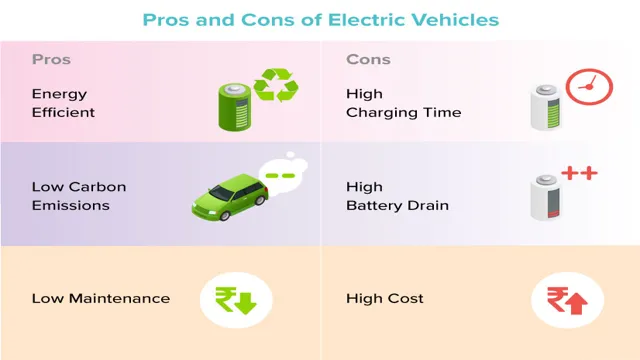
Impact on disposable income
One of the most promising benefits of lower fuel prices is the boost it provides to disposable income. With less money being spent on fuel, consumers have more money left over to spend on other things. This can have a ripple effect on the economy as a whole, as increased spending can lead to higher demand for goods and services, which in turn can lead to job creation.
It can also mean that individuals have more flexibility in their budgets to cover unexpected expenses or to save for the future. For those who live in areas with limited public transportation options, lower fuel costs can be especially impactful on their daily lives, making it easier to afford the necessary means of transportation. Overall, lower fuel costs can have a positive impact on consumers’ wallets and on the economy as a whole.
Domestic manufacturing opportunities
Do electric cars benefit the economy by creating domestic manufacturing opportunities? The answer is a resounding yes. As more and more car manufacturers switch to producing electric cars, this opens up vast opportunities for domestic manufacturing. Not only will the production of electric cars require specialized parts and equipment that can be manufactured at home, but it will also require a significant workforce to help assemble and construct these vehicles.
This can lead to the creation of many new jobs, which in turn will boost the economy. Moreover, as more electric cars are produced domestically, this reduces the need to import gasoline and oil from foreign countries. This decreases the trade deficit and improves the balance of payments.
In summary, electric cars not only benefit the environment, but they also greatly benefit the economy through the creation of domestic manufacturing opportunities.
Statistics on electric car manufacturing in the US and other countries
When it comes to electric car manufacturing, the US has been witnessing a steady growth over the years. The adoption of electric cars has encouraged many automakers to consider domestic manufacturing opportunities. As per reports, the US produced over 330,000 electric vehicles in 2020, and this number is expected to rise in the coming years.
Additionally, countries like China have been leading the charge, accounting for almost 44% of the global electric vehicle production. With the rise in demand for eco-friendly cars, electric car manufacturing has become an essential aspect of the automobile industry. The increasing investment in sustainable energy sources and electric vehicle infrastructure are expected to give an impetus to electric car production.
Moreover, the growth of the electric car market is likely to create job opportunities and stimulate local economies. Therefore, domestic manufacturing opportunities for electric cars are gaining momentum in the US and other countries, paving the way for a sustainable future.
Effect on job creation and economic growth
The promotion of domestic manufacturing opportunities can have a significant positive effect on job creation and economic growth. By investing in the development of local industries, countries can increase their production capacity and create new jobs for their citizens. These jobs can range from skilled technical roles to entry-level positions, providing opportunities for individuals to gain valuable experience and develop their careers.
Moreover, as local manufacturers produce more goods and services, they can contribute to the growth of the national economy by boosting exports and generating revenue. Overall, promoting domestic manufacturing presents an exciting opportunity for countries to achieve sustainable long-term growth while providing their citizens with meaningful employment opportunities. So, why not invest in local industries and reap the benefits for generations to come?
Reduced dependence on foreign oil
Yes, electric cars do benefit the economy by reducing dependence on foreign oil. With the decline of oil production, electric cars provide an alternative fuel source that is renewable and domestic. This reduces the need for foreign oil imports, thereby lowering the amount of money spent on foreign oil, which improves the trade balance and keeps more money in the economy.
Moreover, electric cars produce no harmful emissions, which are known to contribute to climate change. This not only improves air quality and public health but also helps to reduce health care costs. By choosing electric cars, consumers are investing in cleaner and more sustainable transportation, which can drive economic growth and innovation in the energy industry.
Overall, electric cars offer numerous benefits to the economy, the environment, and public health, making them an excellent choice for transportation.
Data on oil imports and impact on trade deficit
Reduced dependence on foreign oil Reducing dependence on foreign oil has been a top priority for many countries, including the United States. The impact of oil imports on trade deficit has been an ongoing concern for policymakers and economists alike. With the increasing global demand for oil, countries that import oil are often at a disadvantage in terms of trade balance, as they have to pay more for oil than they earn from exports.
Through the development of alternative energy sources, such as wind, solar, and hydroelectric power, the United States has made significant strides in reducing its dependence on foreign oil imports. This has not only helped to reduce the trade deficit, but it has also enhanced the country’s energy security and reduced its carbon footprint. With continued investment in renewable energy and improved energy efficiency, the United States can accelerate its move towards energy independence, while creating new jobs and economic opportunities in the process.
Potential for investment in domestic renewable energy sources
Investing in domestic renewable energy sources presents a great opportunity to reduce our country’s dependence on foreign oil. By investing in clean energy, we not only minimize our reliance on imported oil but also reduce our carbon footprint. The potential for investment in domestic renewable energy is vast, ranging from solar, wind, and hydro power to geothermal and biomass energy sources.
These investments have the added benefit of creating green jobs and stimulating the economy. The cost of renewable energy technology is falling rapidly, making it a cost-competitive option to traditional fossil fuels. As a nation, we have an opportunity to lead the shift towards a sustainable future by investing in domestic renewable energy sources.
By doing so, we not only lessen our reliance on foreign oil but also create a greener and healthier environment for ourselves and future generations.
Conclusion
In conclusion, the answer to whether electric cars benefit the economy is a resounding “yes!” Not only do they reduce our dependence on foreign oil and promote sustainable energy practices, but they also create new jobs in the automotive and renewable energy industries. Additionally, the lower maintenance and operating costs of electric cars can put more money back into consumers’ pockets, stimulating spending in other areas of the economy. With all of these benefits, it’s clear that electric cars are not only good for the environment, but they’re also a smart economic choice.
“
Summary of economic benefits of electric cars
Reduced Dependence on Foreign Oil One of the biggest benefits of electric cars is that they reduce our dependence on foreign oil. With electric cars, we can power our vehicles using domestically produced electricity. This means that we no longer have to rely on other countries for our energy needs, which gives us more control over our energy security.
Additionally, because electricity can be produced from a variety of sources, including renewable sources like solar and wind power, it is a more sustainable energy source than fossil fuels. In fact, studies have shown that electric cars can reduce greenhouse gas emissions by up to 50%, which is great news for the environment. Overall, electric cars offer a range of economic benefits, and reducing our dependence on foreign oil is just one of them.
FAQs
How do electric cars benefit the economy?
Electric cars benefit the economy by reducing our dependence on fossil fuels, which can be costly and unstable in price. They also create new job opportunities in the manufacturing and maintenance of the electric vehicles and their components.
Are there any tax incentives for owning an electric car?
Yes, some countries and regions offer tax incentives for owning an electric car, such as reduced sales tax or income tax credits. These incentives can help promote the use of electric cars and encourage their adoption.
What impact do electric cars have on the environment?
Electric cars have a lower carbon footprint than traditional gasoline-powered cars, as they emit fewer pollutants during operation. This can help reduce air pollution and improve the overall health and wellbeing of communities.
How do electric cars compare in terms of maintenance and repair costs?
Electric cars tend to have lower long-term maintenance and repair costs compared to traditional gasoline cars, as they have fewer moving parts and require less frequent oil changes and spark plug replacements. However, repairs to the battery or electric motor can be more costly.
